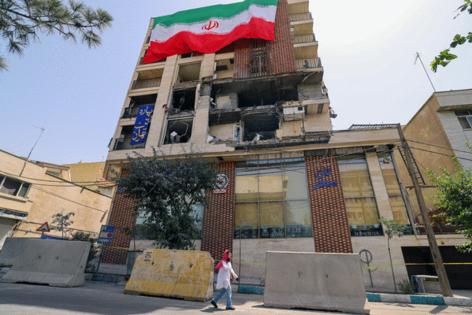Israel and Iran both claim wins as Trump-brokered truce holds
Published in News & Features
A fragile ceasefire between Israel and Iran that the U.S. brokered after 12 days of fighting appeared to be holding on Wednesday, with both sides claiming victory in the war.
After U.S. President Donald Trump’s expletive-laced message condemning early violations, the two Middle Eastern nations said they would honor the truce provided their counterpart did the same. No missile launches have been reported since then. Overnight, the Israeli military said it had identified two drones approaching, most likely from Iran, and they were intercepted before entering the country’s territory.
It remains to be seen if the pause in hostilities turns into a lasting peace between the regional arch-rivals. If it does hold, it would mark the end of an unprecedented conflict that saw Israel and Iran exchange missile volleys that caused hundreds of fatalities.
In the frenetic period since June 13 — when Israel started the war with a strike on Iranian atomic and military facilities — several Iranian military leaders and scientists were killed, the U.S. joined Israel with strikes on Iran’s nuclear sites and Tehran targeted a U.S. base in Qatar.
Israeli Prime Minister Benjamin Netanyahu said an historic victory had been achieved and the threat posed by Iran’s nuclear and ballistic programs had been eliminated, in a broadcast message.
Iranian President Masoud Pezeshkian also claimed victory, saying Israel had failed to achieve its goals, while conceding that the loss of Iranian lives and the damage done to nuclear and civilian infrastructure represent “great wounds to our homeland.”
Israel began to return to a sense of normality after Iranian missile barrages drove millions of residents into bomb shelters and shuttered schools, businesses and the airport.
Traffic intensified, students returned to classes for their final week before summer break, and restaurants and other places of work were springing to life. Tel Aviv’s beaches began to fill up and the U.S. embassy said it would reopen.
Airspace disruptions in the Middle East were resolved. Flights returned to the skies and operations at airports in Doha and Dubai — some of the busiest hubs in the world — resumed. Dozens of Gulf-bound flights on several commercial airlines had been diverted to safer airports on Monday, after Iran’s strike left thousands of passengers stranded in Qatar.
If the ceasefire holds and skies over large swaths of the Middle East remain open, it could bring relief from aviation disruption that has forced airlines to cancel flights, change schedules, and reroute planes around the conflict zone, complicating their operations and forcing them to spend more on jet fuel.
Adding to the sense of relief, Israel said it’s preparing to resume operations at its biggest natural gas field in the next few hours, setting the stage for higher exports to Egypt. The Chevron Corp.-operated field was shuttered on June 13 as a precautionary measure following the exchange of fire between Israel and Iran.
The status of Iran’s underground uranium-enrichment facilities is a key question. Trump disputed a report by the Pentagon that found the airstrikes on Iran had only a limited impact on its nuclear program.
“The nuclear sites in Iran are completely destroyed,” Trump said on Truth Social in response to an intelligence report leaked Tuesday saying it seems unlikely and that core components, including centrifuges, were destroyed.
A recent satellite image of the Natanz nuclear site, taken on Tuesday, shows the beginning of reconstruction efforts, Iran’s state-run TV said in a Telegram post.
©2025 Bloomberg L.P. Visit bloomberg.com. Distributed by Tribune Content Agency, LLC.







Comments